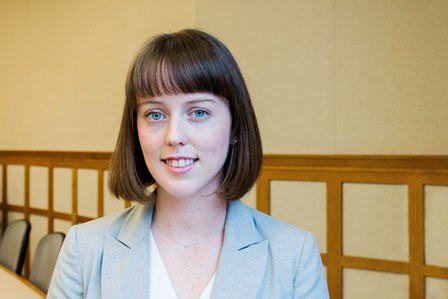In fall 2015, CAP is hosting a Lunch Series featuring our two affiliated Visiting Researchers: Charlotte Proudman, Ph.D. candidate at Cambridge University; and Lisa Owens, Ph.D. candidate at Columbia University. During the talks, each Visiting Researcher will present her research findings, and attendees will have the opportunity to provide feedback and suggestions. Lunch will be provided.
If you would like to attend one or both of the Lunch Series talks, please RSVP here to ensure that we have enough food available.
Upcoming lunches are:
Contact CAP Visiting Researchers and Scholars Program Coordinator Mary Welstead, [email protected], with questions.
A Socio-Legal Perspective of Female Genital Mutilation in England and Wales
 Discussion with Charlotte Proudman, Harvard Law School CAP-affiliated Visiting Researcher and Ph.D. candidate at Cambridge University
Discussion with Charlotte Proudman, Harvard Law School CAP-affiliated Visiting Researcher and Ph.D. candidate at Cambridge University
Wednesday, November 4, 2015
12:00 – 1:00 PM
CAP Suite (WCC 4133)
Harvard Law School
Paper Topic: It is estimated that over 130,000 women and girls living in England and Wales have been cut, and 60,000 girls every year are at risk of female genital mutilation (FGM). Despite Parliament criminalizing FGM in 1985, there has not been one successful prosecution. As a result, significant legal and policy changes were introduced in the UK’s Serious Crime Act 2015. Given the raft of legal and policy initiatives designed to combat FGM, this presentation explores why FGM persists despite criminalizing the practice.
Biography: Charlotte Proudman is a CAP-affiliated Visiting Researcher for Fall 2015. Charlotte is working on a Ph.D. in Sociology at the University of Cambridge, researching the role of law in changing harmful social and cultural practices, and specifically female genital mutilation (FGM) against women and girls in the UK. The empirical research involves semi-structured interviews with FGM-practicing community members and professionals responsible for designing and enforcing legislation. Charlotte worked closely with the Shadow Minister for Preventing Violence Against Women and Girls in drafting FGM legislation which was introduced in the Serious Crime Act 2015. Charlotte’s interest in FGM stems from practicing as a barrister in family law. She is a barrister at the Chambers of Michael Mansfield QC in London.
Family Surveillance of Children and Adolescents
 Discussion with Lisa Owens, Harvard Law School CAP-affiliated Visiting Researcher and Ph.D. candidate at Columbia University
Discussion with Lisa Owens, Harvard Law School CAP-affiliated Visiting Researcher and Ph.D. candidate at Columbia University
Wednesday, November 18, 2015
12:00 – 1:00 PM
CAP Suite (WCC 4133)
Harvard Law School
Paper Topic: Surveillance technologies once associated most strongly with military and government use, are increasingly used between those in intimate relationships, including between family members. While some types of surveillance and intense observation were always found in family life, new technologies enhance significantly such interpersonal surveillance. It is hypothesized that this has implications for interpersonal relationships in general and especially so for the children and adolescents whose selves are formed in a close and intimate surveillance environments. In the current stage of this study, I focus on the parent-adolescent relationship where the parent engages in digital and communications surveillance of the adolescent. In conducting this study, I rely on findings and insights from the social sciences, developmental sciences, the sociology of family law, and the rights of children.
Biography: Lisa Lucile Owens is a CAP-affiliated Visiting Researcher for the 2015-16 academic year. She is currently a Ph.D. candidate at Columbia University in the sociology department. Broadly, Lisa’s work involves the study of agency, identity, and norms in traditional and novel social spaces, including cyberspaces and markets. Her current project uses as point of departure policy analogies from non-cyberspace contexts to discuss agency and identity formation of children in cyberspace. In particular, she focuses on children’s privacy rights, analyzing the rights language already used in both protective measures specific to children and in children’s rights to free expression. This project ultimately interrogates the way rights policies construct “the child” as a rights-holder with agency and identity.
Lisa holds J.D. and LL.M. degrees and is a member of the Massachusetts Bar. Prior to beginning her Ph.D., Lisa worked at the Harvard Management Company and the United Nations High Commissioner for Refugees. She also served previously as the Director of Public Affairs for the State of Alabama at Planned Parenthood of Alabama.
